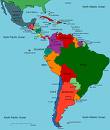Global Research, October 01, 2012

 The ejection of USAID from Russia was a long-awaited and welcome development. Moscow has repeatedly warned its US partners via an array of channels of communication that the tendency of USAID to interfere with Russia’s domestic affairs was unacceptable and, particularly, that the radicalism of its pet NGOs in the Caucasus would not be tolerated.
The ejection of USAID from Russia was a long-awaited and welcome development. Moscow has repeatedly warned its US partners via an array of channels of communication that the tendency of USAID to interfere with Russia’s domestic affairs was unacceptable and, particularly, that the radicalism of its pet NGOs in the Caucasus would not be tolerated. When, on October 1, the decision made by the Russian leadership takes effect, the Moscow-based USAID staff which has been stubbornly ignoring the signals will have to pack and relocate to other countries facing allegations of authoritarian rule…In Latin America, USAID has long earned a reputation of an organization whose offices are, in fact, intelligence centers scheming to undermine legitimate governments in a number of the continent’s countries. The truth that USAID hosts CIA and US Defense Intelligence Agency operatives is not deeply hidden, as those seem to have played a role in every Latin American coup, providing financial, technical, and ideological support to respective oppositions.
USAID also typically seeks engagement with the local armed forces and law-enforcement agencies, recruiting within them agents ready to lend a hand to the opposition when the opportunity arises.
To varying extents, all of the Latin American populist leaders felt the USAID pressure. No doubt, Venezuela’s H. Chavez is the number one target on the USAID enemies list. Support for the regime’s opponents in the country shrank considerably since the massive 2002-2004 protests as the nation saw the government refocus on socioeconomic issues, health care, housing construction, and youth policies. The opposition had to start relying more on campaigns in the media, around 80% of which are run by the anti-Chavez camp. Panic-provoking rumors about imminent food supply disruptions, overstated reports about the crime level in Venezuela (where, actually, there is less crime than in most countries friendly to the US), and allegations of government incompetence in response to technological disasters which became suspiciously frequent as the elections drew closer are bestowed on the audiences as a part of the subversive scenario involving a network of Venezuelan NGOs.
In some cases, the membership of the latter can be limited to 3-4 people, but, coupled to strong media support, the opposition can prove to be an ominous force. Pro-Chavez commentators are worried that USAID agents will contest the outcome of the vote and, synchronously, paramilitary groups will plunge Venezuelan cities into chaos to give the US a pretext for a military intervention.
USAID is known to have contributed to the recent failed coup in Ecuador, during which president R. Correa narrowly escaped an assassination attempt. Elite police forces heavily sponsored by the US and the media which made use of the liberal free speech legislation to smear Correa were the key actors in the outbreak. Subsequently, it took Correa serious efforts to get a revised media code approved in the parliament contrary to the USAID-lobbied resistance.
Several bids to displace the government of Evo Morales clearly employed the USAID operative potential in Bolivia. According to journalist and author Eva Golinger, USAID poured at least $85m into destabilizing the regime in the country. Initially, the US hoped to achieve the desired result by entraining the separatists from the predominantly white Santa Cruz district. When the plan collapsed, USAID switched to courting the Indian communities with which the ecology-oriented NGOs started to get in touch a few years before.
Disorienting accounts were fed to the Indians that the construction of an expressway across their region would leave the communities landless, and the Indian protest marches to the capital that followed ate away at the public standing of Morales. It transpired shortly that many of the marches including those staged by the TIPNIS group, had been coordinated by the US embassy. The job was done by embassy official Eliseo Abelo, a USAID curator for the Bolivian indigenous population. His phone conversations with the march leaders were intercepted by the Bolivian counter-espionage agency and made public, so that he had to escape from the country while the US diplomatic envoy to Bolivia complained about the phone tapping.
In June 2012, foreign ministers of the ALBA bloc countries passed a resolution on USAID. It read: «Citing foreign aid planning and coordination as a pretext, USAID openly meddles in sovereign countries’ domestic affairs, sponsoring NGOs and protest activities intended to destabilize legitimate governments which are unfavorable from Washington’s perspective.
Documents released from the US Department of State archives carry evidence that financial support had been provided to parties and groups oppositional to the governments of ALBA countries, a practice tantamount to undisguised and audacious interference on the US behalf. In most ALBA countries, USAID operates via its extensive NGO networks, which it runs outside of the due legal framework, and also illicitly funds media and political groups.
We are convinced that our countries have no need for external financial support to maintain the democracy established by Latin American and Caribbean nations, or for externally guided organizations which try to weaken or sideline our government institutions». The ministers called the ALBA leaderships to immediately deport USAID representatives who threaten the sovereignty and political stability of the countries where they work. The resolution was signed by Bolivia, Cuba, Ecuador, the Dominican Republic, Nicaragua, and Venezuela. More>> USAID Spying in Latin America